How Often Do Bearded Dragons Poop | TopFlight Dubia
Posted by Ruby Scott on May 19th 2025
How Often Do Bearded Dragons Poop
Did you know that regular pooping is one of the key signs of good health in a bearded dragon?
However, many first-time owners are unsure what “regular” really means. You might be wondering:
- Is it normal if my dragon poops every day?
- Should I worry if they haven’t gone in for a few days?
- Do baby dragons poop more than adults?
This confusion can lead to stress and even delayed care. So, here TopFlight Dubia experts will share how often bearded dragons poop, what’s normal and when to take action.
What Does Bearded Dragon Poop Look Like?
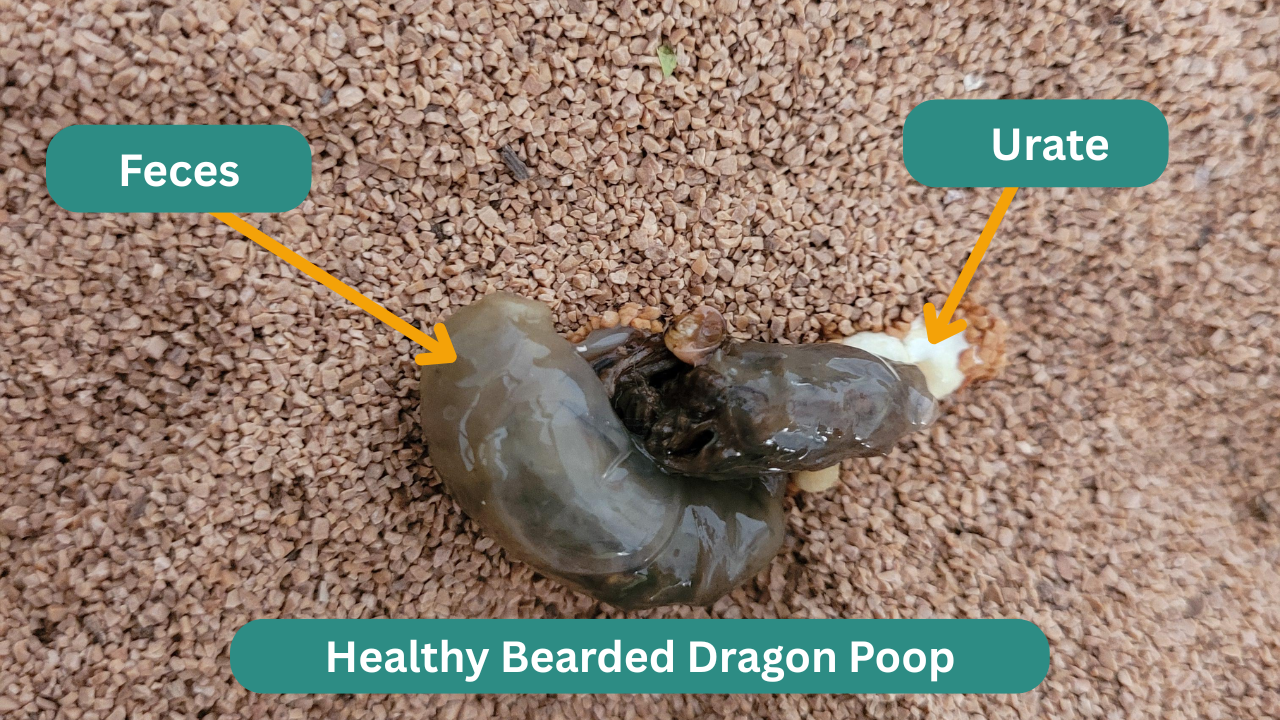
Bearded dragons poop should look like a brown-black colored solid tube with a white tip at the end.
The brown-black portion is called the feces, while the white urate should be white or off-white.
What Does Unhealthy Bearded Dragon Poop Look Like?
Here are five other types of poop that look different and have different implications as well.
1. Runny or Watery
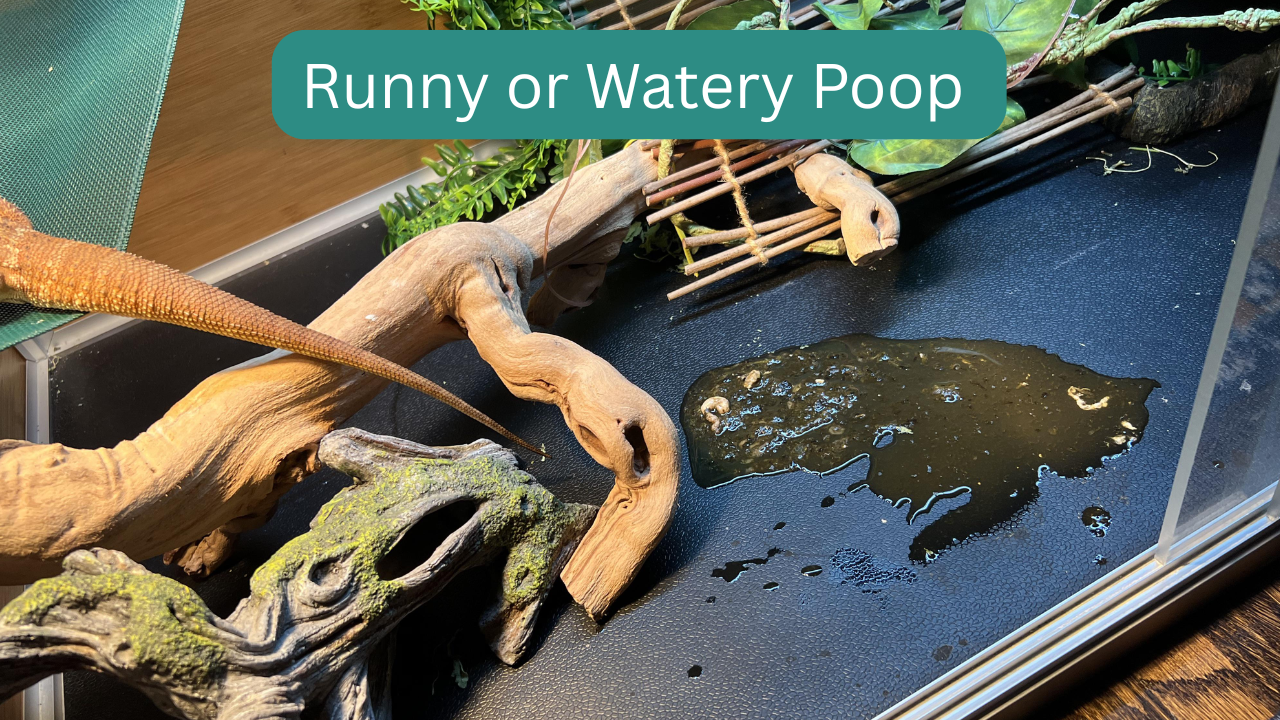
Runny or watery poop is also called as diarrhea. It can be due to:
- Stress caused by environmental changes.
- Shedding.
- Excess water consumption, especially tap water, which might be contaminated.
- Parasites.
|
Here are some indicators of parasites you should be aware of:
|
What to do:
- Consult a vet:
- If diarrhea doesn’t go away.
- If the dragon becomes lethargic or stops eating.
- Check the setup and temperature of your bearded dragon to ensure proper care.
- Temperature:
- Cool side: 77-80°F (25-27°C).
- Warm side: 85-90°F (30-32°C).
- Basking area: 95-105°F (35-41°C) for adults and juveniles.
- Nighttime temperature: 70-75°F (21.5-24°C).
- Recommended humidity: 30-40%.
Green
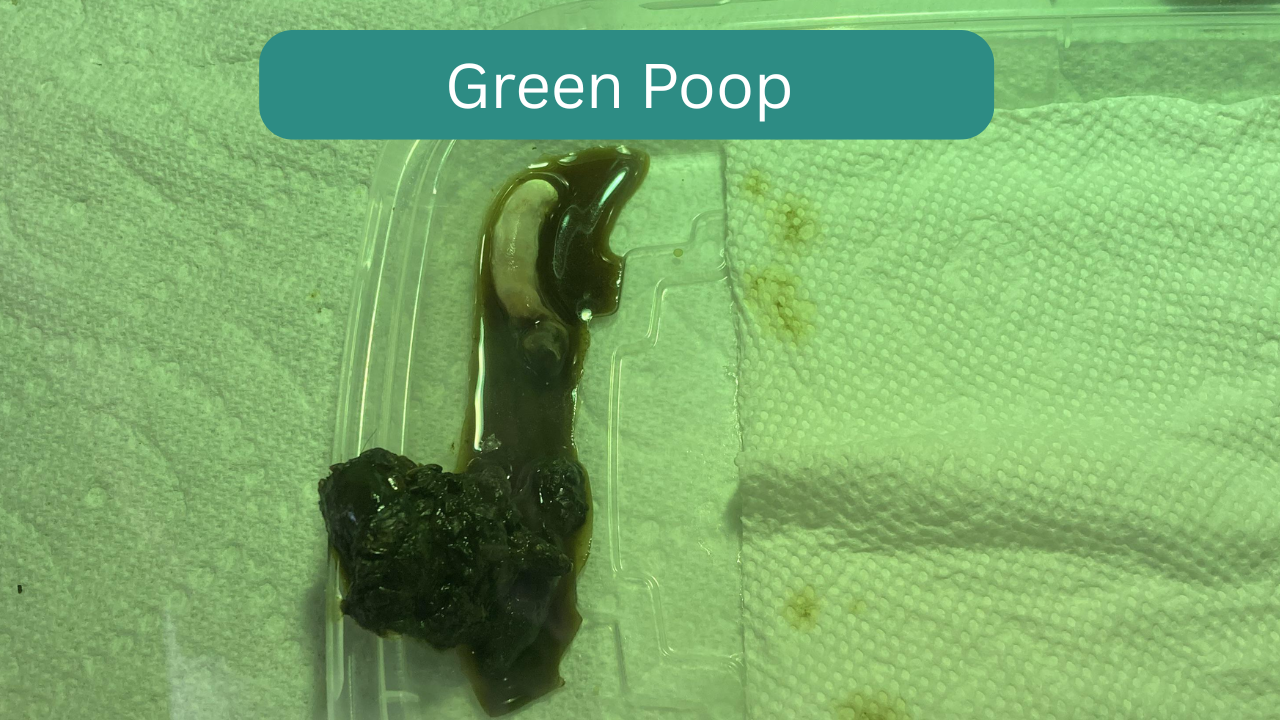
There are different reasons for green feces:
- If they have been eating more veggies that are high in chlorophyll, or dyed/pelleted food.
- Due to the ingestion of substrate (sand or moss).
- Parasite or bacterial infection.
What to do:
- Consider safe substrates like paper towels, newspaper, slate, tile, reptile carpet, etc.
- Take a fecal sample to your local reptile vet to check whether it is due to parasitism.
- If your pet shows other clinical signs, such as decreased appetite, weight loss, or lethargy, consider consulting a veterinarian.
2. Yellow
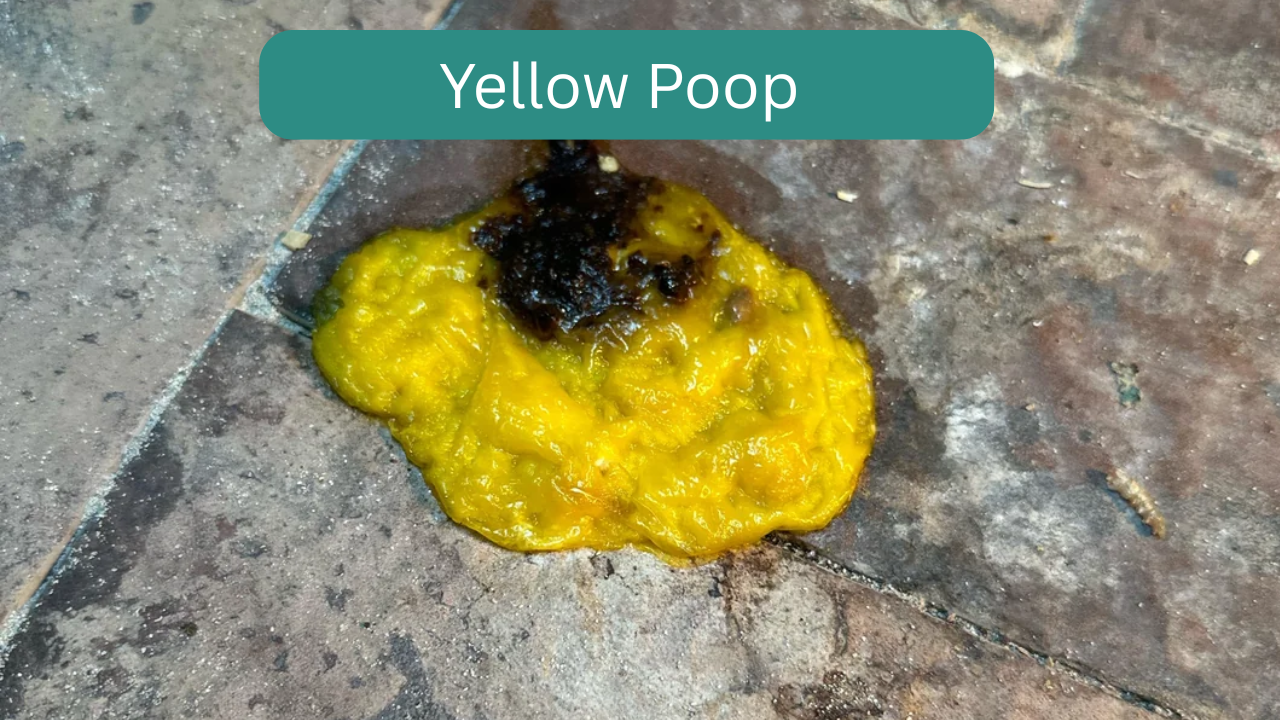
The possible causes for yellow poop in dragons:
- Eating large quantities of yellow or orange vegetables like squash, peppers, sweet potatoes, etc.
- Dehydration.
- Indigestion.
What to do:
- Make sure the dragon is hydrated.
- Over-supplementation or under-supplementation of calcium could cause issues. So, dust the food only once a day.
- Monitor the basking spot temperature (95-105°F) to ensure proper digestion.
- If you are serving pineapple to your pet, limit the amount until the issue improves.
3. Black
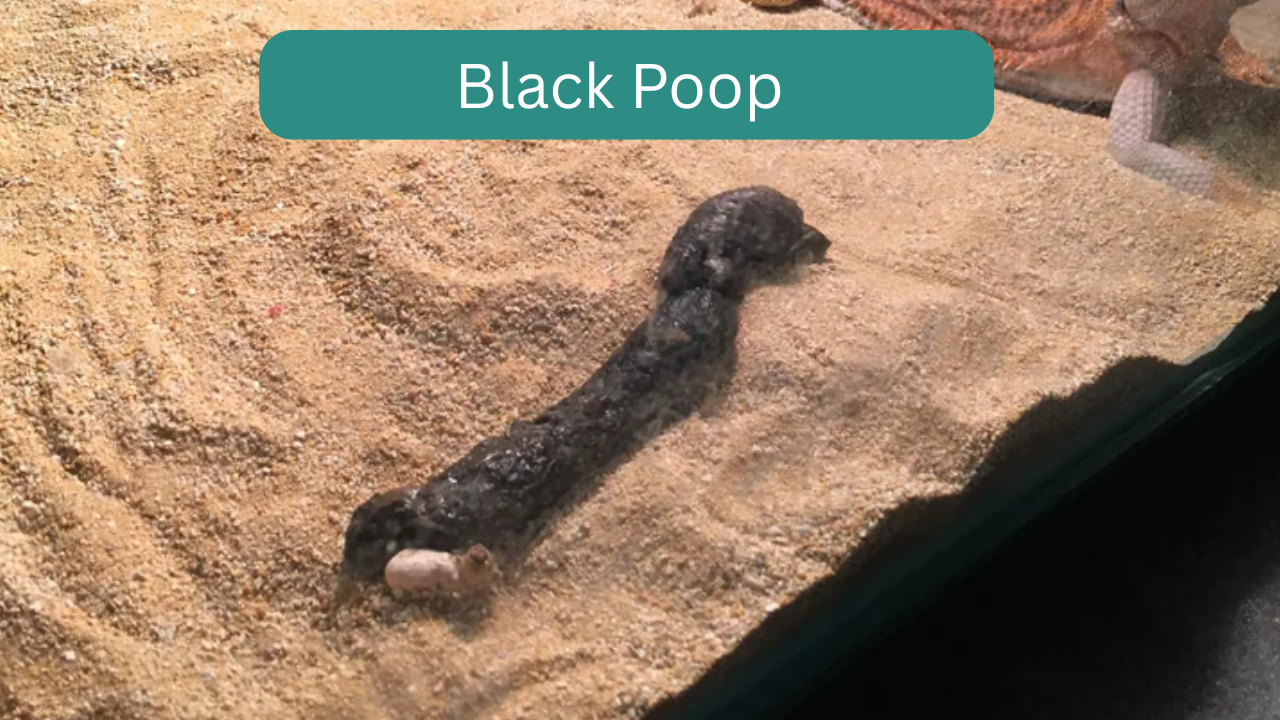
The possible causes for a black poop in bearded dragons are:
- Dehydration.
- Feeding dark colored food and mealworms, which are hard to digest.
- Blood in the digestive tract.
What to do:
- Give short baths daily to help soften the urate and prevent dehydration.
- Focus on a better diet, including Dubia roaches and crickets and appropriate vegetables like Mustard greens and collard greens.
|
NOTE: If your bearded dragon shows other symptoms such as lethargy, loss of appetite, or diarrhea, it is important to consult with a veterinarian. |
4. Red/Bloody
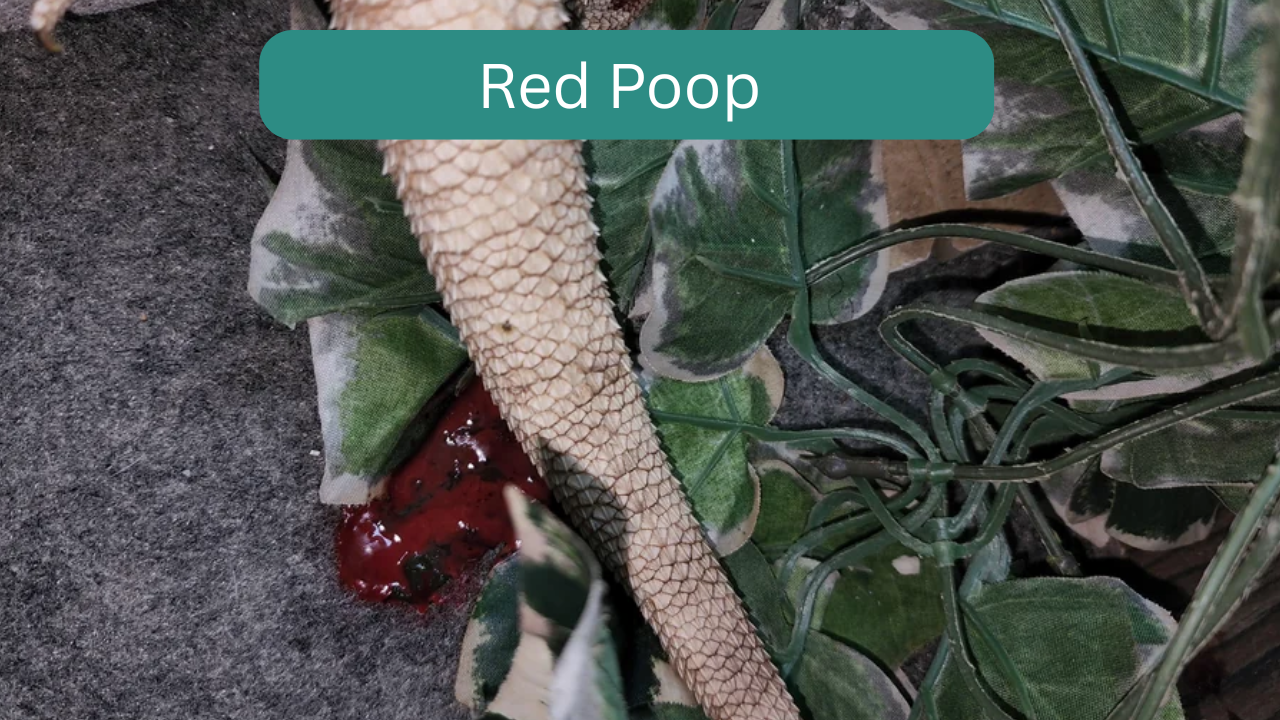
Red poop indicates the presence of blood in the stool. It could also be from eating red fruits or beetroot. Other reasons for red or bloody poop are internal bleeding, parasites, or dehydration.
What to do:
- Take your dragon to an exotic vet immediately to determine what’s causing it. Parasites like Coccidia and pinworms can sometimes cause blood in the poop.
5. White
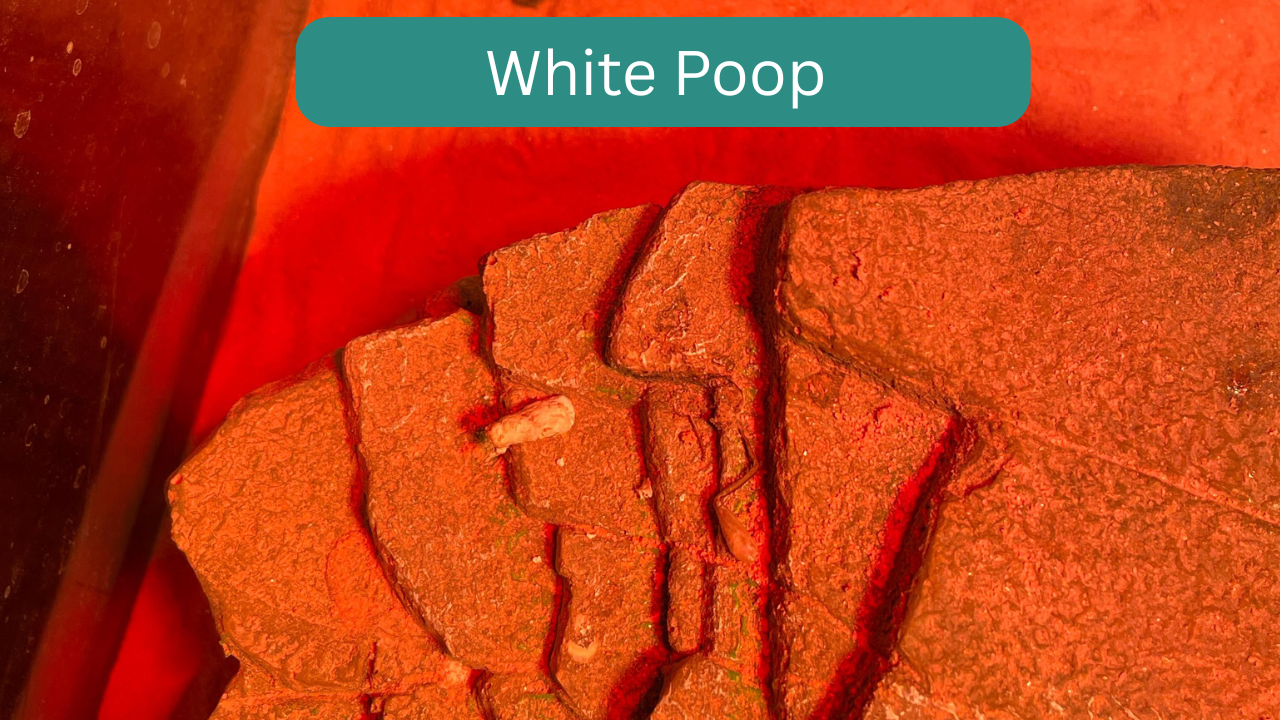
If you notice that your bearded dragon’s poop is entirely white, this is most likely urate.
Urate is a form of waste that bearded dragons excrete in place of liquid urine. It is entirely normal and healthy for them to pass white urate as they are evolved to conserve water efficiently by excreting waste in a solid form.
How Often Do Bearded Dragons Poop?
Bearded dragons poop frequency depends on factors like age, diet and activity levels.
|
Age Group |
Pooping Frequency |
|
Babies (Under 6 Months) |
1- 2 Poops a Day |
|
Juveniles (6-12 Months) |
Once a Day. |
|
Adults (1+ Year) |
Once or Twice a Week. |
Why Do Baby Bearded Dragons Poop So Often?
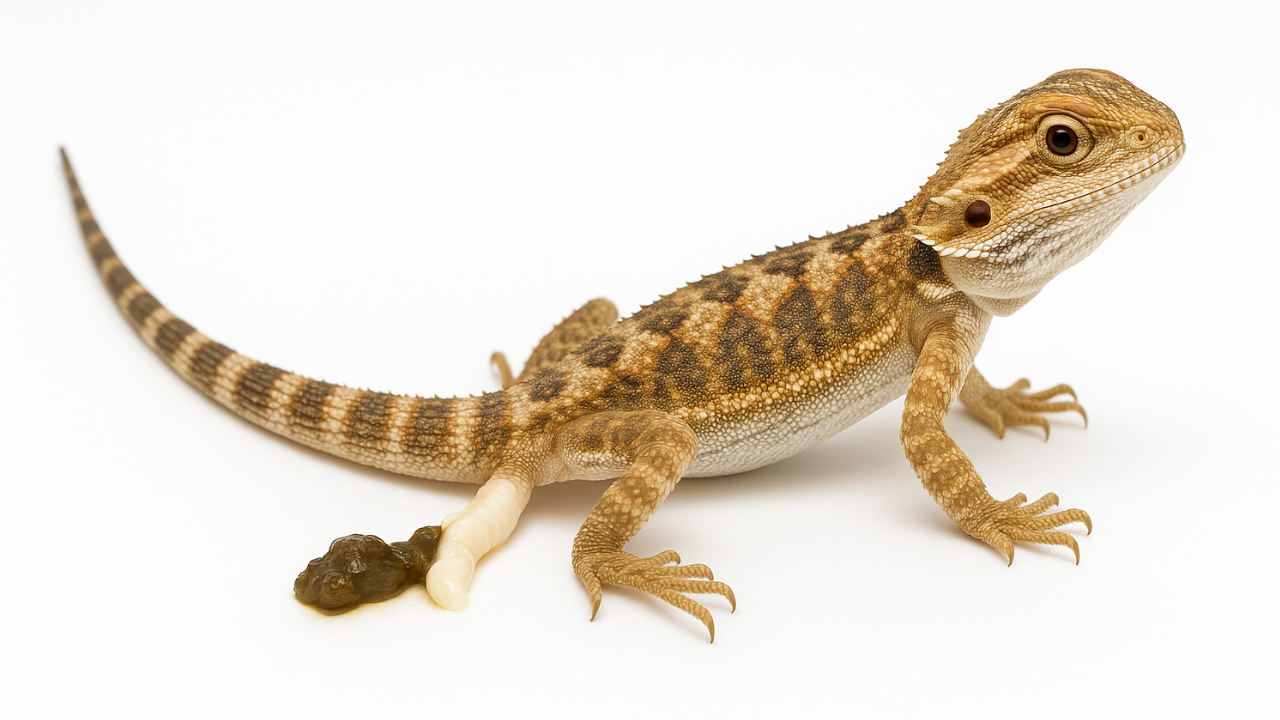
It is due to their high metabolism, larger food intake, and protein-rich diet.
- Young bearded dragons have a faster metabolism, meaning they need to process food and nutrients more quickly, thus resulting in more frequent waste output.
- Younglings are fed a high-protein diet, such as insects (Dubia roaches, Crickets), for proper growth, which results in more frequent pooping.
- Bearded dragons need water for their survival. If they are well-hydrated, they may also poop frequently.
Why Do Adult Bearded Dragons Poop Less Often?
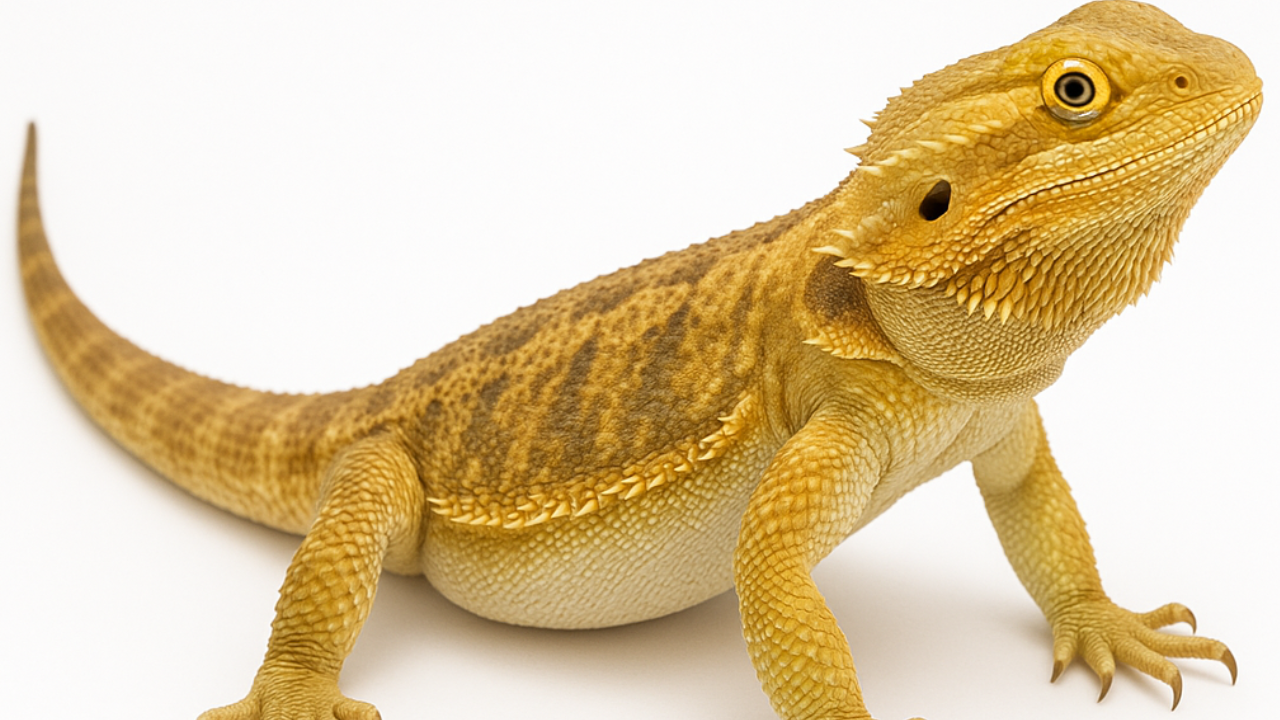
Adult dragons poop less often because their diet shifts to more veggies with fewer insects. Also, the digestion of vegetables takes less time than the digestion of insects, which results in less frequent pooping.
Is It Normal If Your Bearded Dragon Hasn't Pooped in a Few Days?
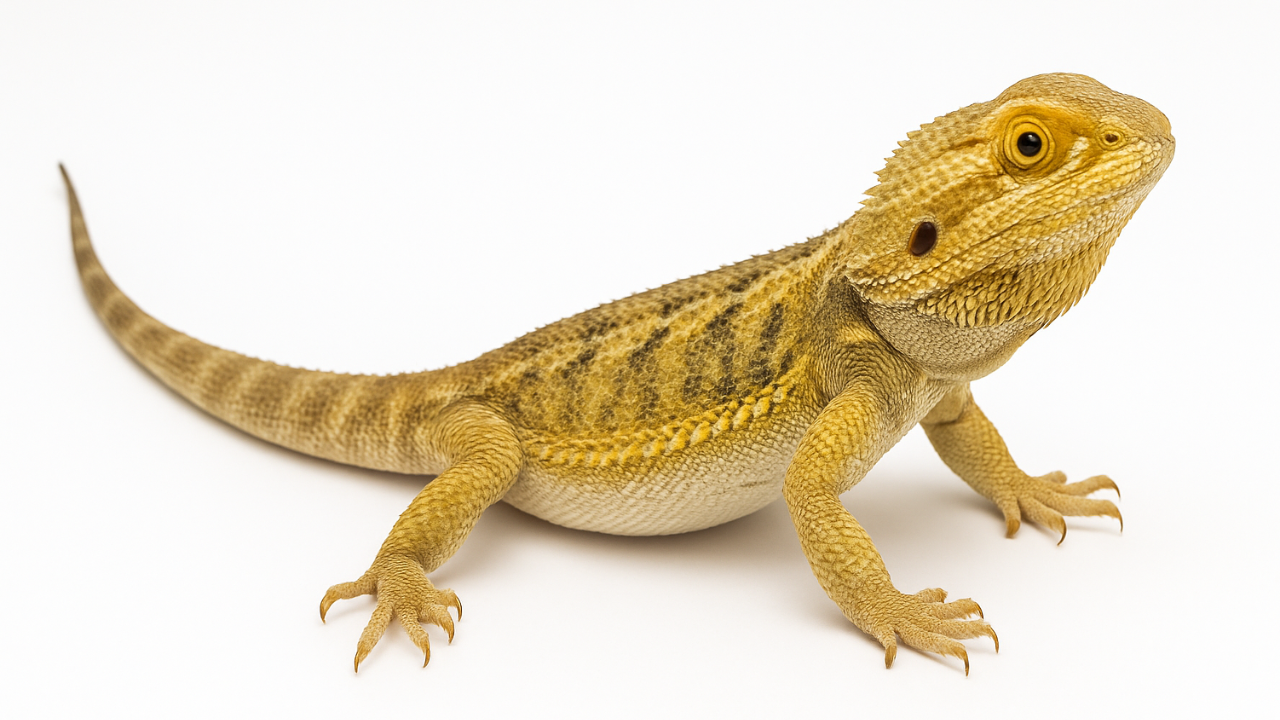
If your bearded dragons hasn’t pooped for few days, then it could be constipation. It is possible, even after a shed, or if the dragon eats worms like superworms or mealworms (hard to digest).
So, you must do these two things:
- Switch to easier-to-digest bugs like Dubia roaches.
- Offer hydrating foods like Butternut Squash or Cucumber.
|
NOTE: Mild constipation for a few days is not uncommon–some beardies poop only once a week especially if they get older. |
Why Is Your Bearded Dragon Not Pooping?
Even after some days, if your pet doesn’t poop. There are several reasons for it:
- Dehydration
- An intestinal blockage occurs after eating a substrate.
- Blockages from inside the body.
- Not eating (Anorexia)
- Parasite (coccidia, Isospora amphibolori)
- Bad Living Conditions
- Metabolic Disease
|
NOTE: It is always important to consult with a veterinarian regarding their inability to poop. |
How Do You Get Baby Bearded Dragon to Poop?
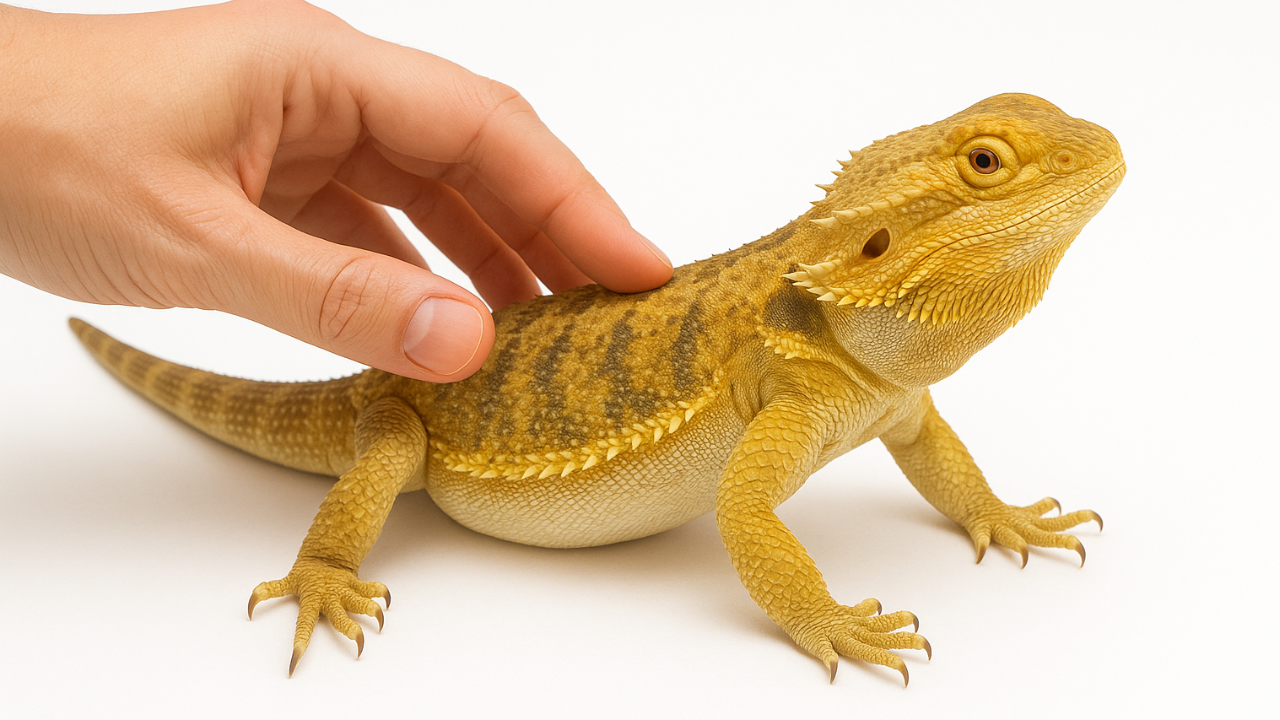
- Soak in warm water (Around 95°F) for 30 minutes daily for a few days, then shift to a routine soak every two or four days. This will help keep dragon hydrated and stimulate regular pooping.
- Sometimes, you can feed a high fiber diet using a tube every three days.
- Mist vegetables with water before you feed them to your pet.
- While in the bath or under basking lamp, gently massage their belly to stimulate regular pooping.
- Offer a varied diet of high-fiber vegetables, like collard greens and mustard greens. and gut-loaded insects (Dubia roaches, crickets, or locusts). You can also serve butternut or yellow squash daily, which can help with digestion.
- Use canned pumpkin or prune baby food, a natural laxative. Mix it with a little water and olive oil for easier digestion.
- Give little bit of apples or unsweetened applesauce to your pet as they may help make dragon to poop.
Conclusion
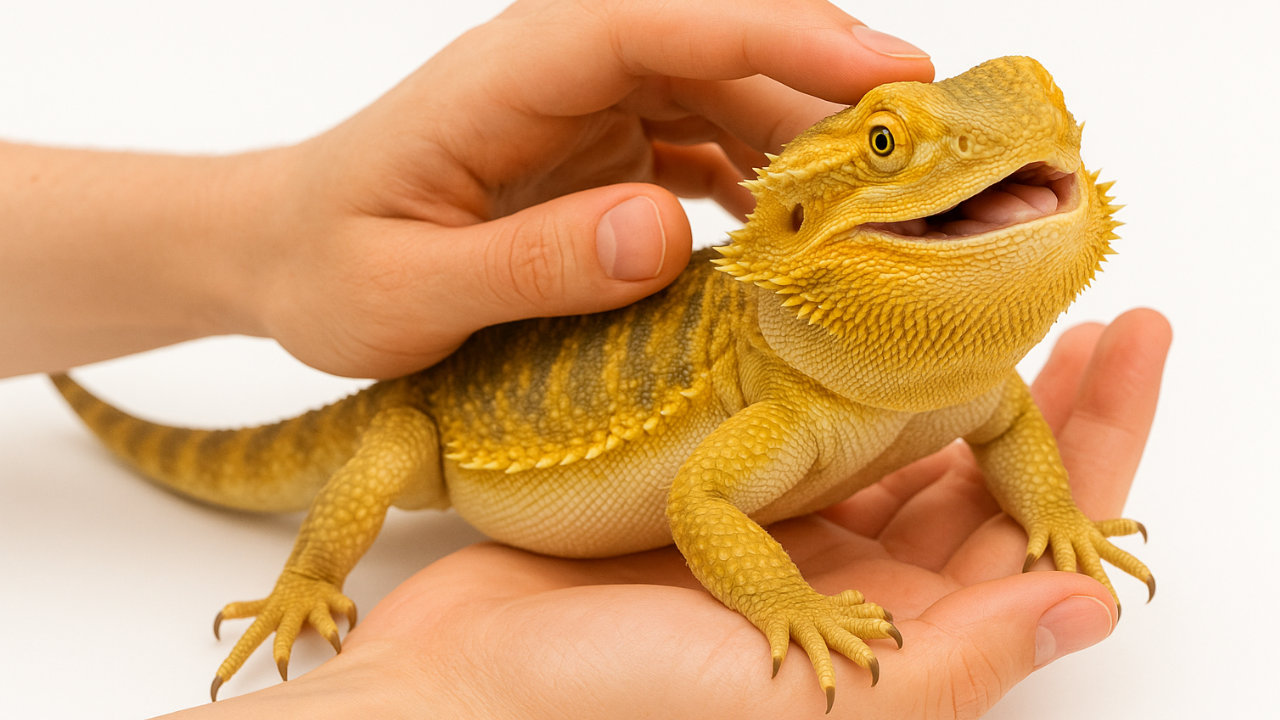
Bearded dragons need a healthy diet, proper hydration, and a suitable environment for proper digestive health. Regularly monitor their pooping frequency and behavior for any signs of distress. If you notice prolonged constipation or abnormal stool, consult a vet. Lastly, make sure to offer high-protein insects like Dubia roaches and vegetables for their optimal health.
Frequently Asked Questions (FAQs)
01. How to clean bearded dragon poop?
02. Why does the bearded dragon poop on you?
- Being scared.
- Your body warmth remind them of warm bath which will make them need to poop.
- Some bearded dragons don’t want to poop in their own space, so they do it when they’re out.

